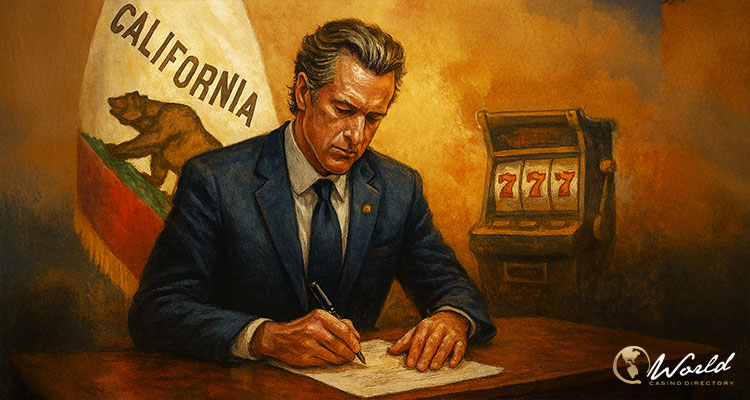California has officially outlawed online social games and sweepstakes-style gambling following Governor Gavin Newsom’s signature of Assembly Bill 831 (AB 831). The measure, which faced strong opposition from industry stakeholders, passed both chambers of the Legislature without a single vote against it and takes effect January 1, 2026.
Unanimous Legislative Support for Ban
The legislation—crafted through a Senate amendment process that transformed AB 831 into an anti-sweepstakes measure—was approved by the State Senate 36–0 and by the Assembly 63–0 before reaching the governor’s desk. By signing it into law, Newsom capped months of bipartisan consensus and debate surrounding the future of unregulated digital gambling platforms in California.
The law prohibits the operation of sweepstakes casinos, sometimes referred to as “dual currency” gambling, and extends liability to entities that facilitate such activity. This includes any “financial institution, payment processor, geolocation provider, gaming content supplier, platform provider, or media affiliate.” Violations carry penalties of up to $25,000 in fines, one year in county jail, or both.
Supporters of the bill, including the California Nations Indian Gaming Association (CNIGA) and other tribal operators, argued the legislation was necessary to defend the tribes’ constitutionally recognized exclusive rights to offer gaming in the state.
The Social Gaming Leadership Alliance (SGLA), which represents sweepstakes operators, strongly opposed AB 831 and campaigned for a veto, calling the measure economically damaging and anti-competitive. The group cited an internal study claiming the ban could cost California $1 billion in annual economic activity and $200 million–$300 million in potential tax revenue that might have been generated under a regulated model.
Jeff Duncan, SGLA’s Executive Director, criticized the bill’s passage, saying: “Today’s hearing exposed the committee’s complete disregard for facts, economic reality, and the voices of tens of thousands of Californians all to hand monopoly power to tribes that have already invested hundreds of millions of dollars in Las Vegas and California coastal properties.”
Following Newsom’s approval, Duncan issued another statement expressing frustration with the governor’s decision: “Voters, players who love online social games, California tribes and online social games operators all made their position clear: they didn’t want a ban on this popular, safe form of entertainment.”
He added: “We hoped that Governor Newsom would see past the anti-competitive efforts of the powerful, well-funded tribes behind this bill and veto AB 831, but he chose the easy, short-sighted path and turned his back on choice, innovation and economic gains.”
Broader Regulatory Context
AB 831’s enactment makes California the largest U.S. state to prohibit sweepstakes-style gambling. With nearly 39 million residents, the state’s decision marks the most significant loss yet for the sweepstakes casino sector.
The movement to restrict social casino-style gaming has gained momentum nationwide. Montana was the first state in 2025 to outlaw sweepstakes operations, followed by Connecticut and New Jersey. Both New York and Nevada have similar bills awaiting gubernatorial approval.
While most major tribal gaming entities endorsed the bill, several smaller nations, including the Kletsel Dehe Wintun Nation, Sherwood Valley Rancheria of Pomo Indians, Mechoopda Indian Tribe of Chico Rancheria, and Big Lagoon Rancheria, opposed it, arguing that the ban undermines tribal sovereignty and favors large casino-owning tribes.
Legal analysts suggest that the law could serve as a template for other U.S. states considering similar action, particularly amid growing scrutiny of social casinos, fantasy contests, and dual-currency platforms. For the industry, the outcome signals the largest regulatory setback to date and reshapes the national conversation on how states define, regulate, and enforce gaming boundaries in the digital era.


